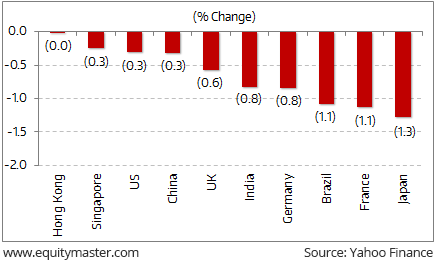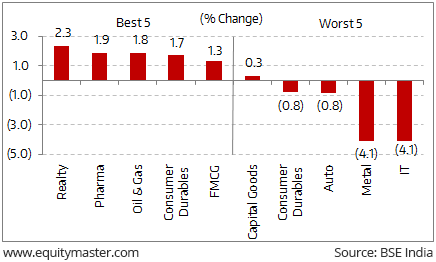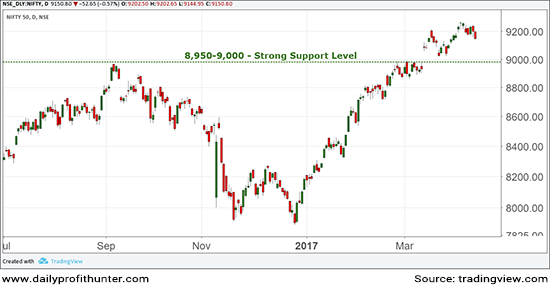- Home
- Todays Market
- Indian Stock Market News April 13, 2017
Global markets Remain Choppy as Geopolitical Tensions Rise Thu, 13 Apr RoundUp
Global markets were mixed during the week as investors remained cautious in the face of uncertainty over Syria, escalating fears of a new weapons test by North Korea and tightening polls in the French presidential election.
Investors were concerned about tensions between the United States and Russia after US President Donald Trump suggested there could be no peace in Syria while Moscow-backed President Bashar al-Assad remains in power. Similarly, tension has escalated in the Korean Peninsula following a warning from North Korea of a nuclear attack on the US.
The US dollar and Treasury yields tumbled on Thursday on the US President Donald Trump's comments favouring lower interest rates. The US markets were down 0.3% for the week gone by.
Asian stocks put in a mixed performance amid a raft of regional economic data. The stock market in China and Japan was down by 0.3% and 1.3% respectively for the week gone by.
The stock market in France suffered the heaviest losses of the major Eurozone markets, as opinion polls showed left-wing candidate Jean-Luc Melenchon who had previously not been seen as a serious contender gaining ground ahead of the first round of voting in the presidential election on April 23. France's CAC 40 was down by 1.1% for the week gone by.
Oil prices rose on Wednesday, putting crude futures on track for their longest streak of gains since August 2016. Saudi Arabia was reported to be lobbying OPEC and other producers to extend a production cut beyond the first half of 2017. Crude was up 1.3% for the week gone by.
Key World Markets During the Week

Back home, rising geopolitical tensions, coupled with disappointing fourth quarter result of an IT major dragged the Indian equity markets lower. The BSE Sensex was down 0.8% for the week, while the NSE Nifty was down 0.7%. Midcap and Smallcap stocks outperformed the frontline indices to gain 0.8% and 1.4%, respectively.
BSE Indices During the Week

Now let us discuss some key economic and industry developments during the week gone by
Key macro-economic data released earlier this week showed India's expanded last month due to healthy demand conditions and softer inflationary pressure. The Nikkei India Manufacturing Purchasing Managers' Index (PMI) which is a composite indicator of manufacturing performance rose to a five-month high of 52.5 in March, from 50.7 reported for February.
An index reading of above 50 indicates an overall increase in economic activity and below 50 an overall decrease.
In other news update, the Prime Minister's Office (PMO) recently conducted a meeting with representatives of private developers to review the progress of the affordable housing schemes under the government's 'Housing for All' initiative by 2022. In the meeting, the PMO discussed challenges faced by developers while launching and executing such housing projects, including high land cost and slow approval processes.
The meeting was attended by representatives of industry bodies National Real Estate Development Council (NAREDCO), The Confederation of Real Estate Developers' Associations of India (CREDAI), and MCHI-CREDAI apart from officials of the National Housing Bank. One shall note that the affordable housing segment saw an increase in new launches in 2016 and has also made things merrier for housing financing companies.
However, there remain many challenges before India will see affordable housing picking up. These include high land prices and state-level taxes as well as lack of builders for affordable housing. Right now, the "Housing for All" initiative by the government still seems a distant dream. For the above initiative to gain traction, the cost of constructing homes needs to fall. For this to happen, first and foremost, the cost of land in and around cities needs to fall.
For the cost of land to fall, the government needs to increase supply. This can be done by increasing the FSI allowed on buildings. Further, the government also needs to sell some of the land parcels that it owns in and around cities. This is essentially the land that it inherited from the British colonial administration.
Just Released: Multibagger Stocks Guide
(2017 Edition)
In this report, we reveal four proven strategies to picking multibagger stocks.
Well over a million copies of this report have already been claimed over the years.
Go ahead, grab your copy today. It's Free.

Moving on to news about the economy. Industry confidence and optimism as measured by the Business Confidence Index (BCI) is at an all-time high, according to the Confederation of Indian Industry (CII). The CII Business Confidence (BCI) has gone up to an all-time high of 64.1 during the fourth quarter of 2016-17, as against 56.5 recorded in the previous quarter.
A sharp uptick in business outlook, at the onset of 2017, underpins the hope that the reform initiatives of the government would unravel a host of investment opportunities for firms, going forward, industry body CII said on the surge in the index. The significant rise in the index this quarter could be attributed to the distinct improvement in the 'expectations index' even as there is a marginal uptick in the 'current situation index', indicating that business sentiment is strong and firms are particularly upbeat about activity in their sectors in the future, the industry body observed.
In the other news, India's gold import witnessed a fall of about 24% to $23.22 billion in April-February period of the last fiscal, compared to US$30.71 billion in the corresponding period of 2015-16, a development that could ease the worries of the rise in current account deficit (CAD).
According to the commerce ministry data, India had witnessed a 43% year on year decline in gold imports in the month of January, 2017, mainly due to demonetization, on subdued demand resulting from a cash crunch. India is one of the largest gold importers in the world, and the imports mainly take care of the demand from the jewellery industry.
The contraction in the gold imports during April-February helped in narrowing the trade deficit to US$95.2 billion during the 11-month period of 2016-17, as against US$114.3 billion in the same period of the previous fiscal. For the full year 2015-16, CAD stood at US$ 22.1 billion, or 1.1% of GDP, as against US$ 26.8 billion, or 1.3%, in 2014-15.
Meanwhile, developments in three states over the past week have brought the debate on the waiver of farm loans back under the political spotlight. In Uttar Pradesh, the newly-elected Bharatiya Janata Party government under Chief Minister Adityanath recently announced that it would write-off crop loans of up to Rs 1 lakh for about 21.6 million small and marginal farmers.
Reserve Bank of India Governor Urjit Patel expressed his displeasure at the spate of loan waiver announcements in different states. It would impact credit discipline and incentives for future borrowers to repay. In other words, waivers engender a moral hazard.
However, Vivek Kaul pointed out that if there is a moral hazard for the farmer, there is also one for corporates. And if the RBI governor has pointed out one, he should have pointed out the other as well. Here's a snippet of what he wrote in his Diary titled: Dear Mr Urjit Patel, Have You Ever Heard of Wasim Barelvi?
- "corporate loan write-offs have led to the situation of diminishing bank capital. This has led to the central government having to recapitalise the PSBs over the years. This money is ultimately borrowed by the government and leads to crowding out, higher interest rates and a weaker national balance sheet. All these issues pointed out by Patel in case of farm loan waive-offs apply to corporate write-offs as well."
Movers and Shakers During the Week
| Company | 24-Mar-17 | 31-Mar-17 | Change | 52-wk High/Low |
|---|---|---|---|---|
| Top Gainers During the Week (BSE Group A) | ||||
| CONTAINER CORP | 1,012.10 | 1,175.00 | 16.1% | 1,235 / 844 |
| BHUSHAN STEEL | 58.40 | 67.50 | 15.6% | 69 / 35 |
| BPCL | 637.85 | 52.50 | 14.7% | 735 / 441 |
| PIRAMAL ENTERPRISES | 1,960.00 | 2,247.15 | 14.7% | 2,095 / 1,048 |
| RURAL ELECT | 184 | 207.25 | 12.6% | 211 / 76 |
| Top Losers During the Week (BSE Group A) | ||||
| ADANI POWER | 42.05 | 32.8 | -22.0% | 46 / 23 |
| RELIANCE COMMUNICATIONS | 40.75 | 35.75 | -12.3% | 60 / 31 |
| ADANI PORTS & SEZ | 357.25 | 319 | -10.7% | 358 / 170 |
| VEDANTA LTD | 272.8 | 244.2 | -10.5% | 278 / 92 |
| JAIPRAKASH ASSO. | 14.21 | 12.83 | -9.7% | 17 / 5 |
Some of the key corporate developments in the week gone by
In news from stocks in the pharma sector. According to an article in a leading financial daily, Cipla's subsidiary, Cipla Medpro South Africa Pte has completed the acquisition of Anmarate (Pty) Ltd, South Africa. The deal is estimated at around ZAR 26 million. Reportedly, the acquisition would help strengthen the market position of the company. The company acquired 4,000 shares of ZAR 1 each, representing 100% of the Anmarates share capital. Further, the acquisition formed part of its strategy to acquire selected products in the growing therapeutic categories. Anmarate is engaged in manufacturing and distribution of pharmaceutical products.
The M&A activity in the Indian pharma space has been on the rise in recent times. At the end of the day, whether the company is able to derive value from the acquisitions and augment the overall performance will be the key thing to watch out for.
To know more about the company's financial performance, subscribers can access to Cipla's latest result analysis and Cipla stock analysis on our website.
Moving on to the news from stocks in FMCG sector. As per an article in a leading financial daily, ITC Limited is looking to increase its share in the packaged fruit juice market in India to about 20% in the next five years from 7% at present.
The packaged fruit juice segment is currently estimated to be around Rs 25 billion. ITC is the third largest juice maker, after Dabur, which is in the top spot with its Real and Real Activ brands, and PepsiCo India's Tropicana, which is at the second position, the reports noted.
The company is looking to expand its sales network to meet the target. ITC had forayed into the premium packaged fruit drinks market in 2015 with the acquisition of the B Natural brand. Further, ITC also plans to increase retail points of its luxury chocolate brand Fabelle and take it outside its hotels the only places where it is available currently.
In news from stocks in the telecom sector. Less than a week after the Telecom Regulatory Authority of India (TRAI) ordered Reliance Jio (Jio) to withdraw its free offer, the company has come up with another similar offer with disruptive pricing. The company unveiled a new plan for mobile phone subscribers, offering three months of freebies besides 1GB data a day for a one -time recharge of Rs 309 and above, drawing criticism from Bharti Airtel, which deemed it similar to the new entrant's previous plan that the regulator had stopped.
Bharti Airtel went on to say that the new plan resembled 'old wine in a new bottle' and has urged TRAI to look into the matter.
The entry of Reliance Jio and the fierce tariff war it has triggered has set off brisk activity in the industry for fundraising and consolidation, as the incumbents look for ways and means to fend off the competition.
In news from stocks in the IT sector. Infosys declared a 4QFY17 result. The IT major reported a profit at Rs 36.03 billion for January-March quarter, degrowth of 2.8% against Rs 37.08 billion in the previous quarter. Revenue fell 0.88% to Rs 171.2 billion, compared with Rs 172.73 billion previous quarter.
The company offered a bleak outlook for the year ahead, with the full fiscal 2017-18 revenue growth guidance at 6.1-8.1%, lower than the industry average expected for the period. Further, the management has identified US$2 billion to be paid to shareholders via share buybacks or dividends. Meanwhile, Infosys also announced a dividend of Rs 14.75 per share.
Moving on to the news from stocks in oil & gas sector. As per an article in a leading financial daily, Oil India Ltd has raised US$500 million through overseas bonds to pay for the bridge loan it had taken to acquire stake in Russian oilfields. Oil India International Pte Ltd (OIIPL), a wholly owned subsidiary of OIL, priced the 10-year notes at a coupon of 4% per annum payable half year. The notes will be listed on the Singapore Stock Exchange.
Reportedly, OIL had taken a bridge loan to pay for its share of the acquisition of stake in Taas-Yuryakh Neftegazodobycha LLC.
Meanwhile, oil companies have announced that the prices for petrol and diesel will be changing every day from 1 May 2017 in accordance with that of the international prices. The plan will be carried out in five cities initially before its applied in the rest of the country.
The decision was collectively taken by state-owned fuel retailers Indian Oil Corp (IOC), Bharat Petroleum Corp Ltd (BPCL) and Hindustan Petroleum Corp Ltd (HPCL), which own over 95% of nearly 58,000 filling stations in the country. The five cities in question are Puducherry, Vizag, Udaipur, Jamshedpur and Chandigarh. Introduction of dynamic pricing in these five cities will reveal the problems faced by this system before it is implemented across the country.
The current policy on the revision of fuel prices requires prices to be changed every fortnight after considering volatility in the currency and global oil markets. Daily change in fuel prices would eradicate big leaps in prices that currently happen every fortnight, and also keep the consumer more aligned to market dynamics. The move will make fuel pricing in India more capable of competing with global fuel prices, the reports noted.
Moving on to news from stocks in the PSU sector. According to an article in The Economic Times, world's largest coal miner Coal India is mulling a plan to acquire coking coal mines in Australia.
While the company announced that from its list of probable destinations for investment, including the US, Colombia, Canada and Indonesia, the coal giant has decided to focus on Australia and South Africa for the current acquisitions.
The state-owned coal giant started exploring opportunities outside India in January 2017, via its subsidiary Coal Videsh. Lack of technological wherewithal required to build domestic reserves prompted the public-sector coal miner to explore opportunities abroad in January 2017.
The government of Australia has put on offering some coking coal blocks. Coal India has initiated dialogues with the Australian government to supplement the requirement of country's metallurgical coal. However, the discussions are in a very preliminary stage. India's dependence on imports is particularly heavy on coking coal which is a vital ingredient in the steel making process.
And here's an update from our friends at Daily Profit Hunter...
The Nifty 50 Index traded on a negative note during the week. It started the week with an upside gap but slipped immediately to close the session negative. The index shot up 56 points on the next day to recover the previous day's loss. But these gains were temporary as the index dragged 86 points in the next two days to end the weekly session 0.51% down. Most of the selling was seen on back of geopolitical tension. The 8,950-9,000 level remains a strong support zone for the index. You can read the detailed market update here...
Nifty 50 Index Slipped on Geopolitical Tension

For information on how to pick stocks that have the potential to deliver big returns, download our special report now!
Read the latest Market Commentary


Equitymaster requests your view! Post a comment on "Global markets Remain Choppy as Geopolitical Tensions Rise". Click here!
Comments are moderated by Equitymaster, in accordance with the Terms of Use, and may not appear
on this article until they have been reviewed and deemed appropriate for posting.
In the meantime, you may want to share this article with your friends!